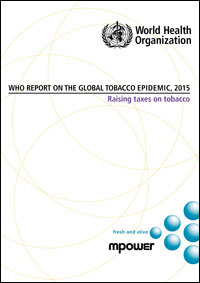
9 July 2015 - The World Health Organization Framework Convention on Tobacco Control (WHO FCTC) Secretariat welcomes the publication of the WHO report on the global tobacco epidemic, 2015, which coincides with the 10th anniversary of the entry into force of the WHO FCTC. The 180 Parties to the WHO FCTC – the world’s first public health treaty under the auspices of WHO – have committed to making tobacco control and saving lives a priority.
Price and tax measures to reduce the demand for tobacco, the focus of this report, are one of the core demand reduction strategies that the WHO FCTC requires its Parties to implement: in Article 6, Parties recognize that, “price and tax measures are an effective and important means of reducing tobacco consumption…”. Further, the WHO FCTC calls on the Parties to adopt and maintain tax and price policies that will, “contribute to the health objectives aimed at reducing tobacco consumption”. To assist Parties in their efforts, the Conference of the Parties (COP) adopted a set of guiding principles and recommendations in 2012, and 2 years later, in October 2014, a full set of Guidelines for implementation of Article 6 (Price and tax measures to reduce the demand for tobacco) of the WHO FCTC.
This effort has already started to bear fruit. As detailed in this report, more than half of countries have increased their excise taxes since 2012, many of which implemented changes in their tobacco taxes in line with these new guidelines.
The WHO FCTC Secretariat, in collaboration with WHO and in partnership with the World Bank (an intergovernmental organization accredited as observer to the Conference of the Parties), has engaged with governments of more than 30 Parties to review their implementation of price and tax measures as part of a needs assessment exercise. Parties with identified needs were given targeted assistance in the area of tobacco taxation in line with the guidelines. Cook Islands, Gambia and Jamaica are just a few of the countries that have increased tobacco tax rates as part of this process.
But challenges remain. Tax increases have not been uniform – substantial differences in prices and taxes still exist among neighbouring countries and even within subregions and regions of some countries.
We will continue to work to ensure that WHO FCTC requirements and guidelines are appropriately addressed by each Party. Regional and subregional economic organizations have the unique opportunity to promote tobacco tax harmonization within their constituencies to eliminate differential tax treatment. Additionally, the WHO FCTC Secretariat strongly encourages WHO Member States who are not yet Parties to the WHO FCTC to put in place the evidence based provisions of the treaty that serve as the foundations of meeting its requirements.
Article 5.3 of the WHO FCTC requires that, “in setting and implementing their public health policies with respect to tobacco control, Parties shall act to protect these policies from commercial and other vested interests of the tobacco industry…”. However, Parties report that the tobacco industry often presents significant challenges to implementation of the WHO FCTC. Since increasing tobacco taxes is a potent public health tool that measurably reduces tobacco consumption, it is strongly opposed by the tobacco industry and its front groups, both openly and behind the scenes, who actively interfere with Parties’ development and introduction of strong tobacco taxation policies.
To identify industry attempts at interference, Parties, non-Parties and observers from intergovernmental and civil society organizations need to remain vigilant. Front groups such as chambers of commerce and international think tanks engage with governments to prevent, dilute, delay or derail taxation policy development. One preferred tactic is to instill false fears about the escalation of illicit tobacco trade due to higher taxes and prices and promote “solutions” for the illicit trade problem that are not in line with Article 15 (Illicit trade in tobacco products) of the WHO FCTC.
Governments have the power to counter industry interference and implement strong tax policies. The WHO FCTC Secretariat, in collaboration with WHO, the World Bank, the International Monetary Fund and other observers to the COP, stands ready to promote and support Parties as they work to adopt taxation measures that achieve public health goals. The WHO FCTC provides three main policy approaches to do so: application of the provisions and guidelines for implementation of Article 6; addressing tobacco industry inference by adopting guidelines for implementation of Article 5.3; and implementation of Article 15 and entry into force of the Protocol to Eliminate Illicit Trade in Tobacco Products. These approaches, if used together, will have a combined effect that will ensure that tax and price policies lead to reduced tobacco consumption along with all the attendant health benefits.
We would like to congratulate our WHO colleagues at all levels (from headquarters to Regional and Country Offices), as well as the many Bloomberg Initiative partners, for the solid research findings published here. This high-quality information and comparable data on progress in implementing selected demand reduction measures, as well as the monitoring mechanisms that allow the tobacco epidemic to be measured and interventions evaluated, shows the advances that have been made and provides guidance for future progress.
We hope the WHO report on the global tobacco epidemic, 2015, series continues to contribute to the advancement of global tobacco control and that consideration will be made to discuss the remaining WHO FCTC demand and supply reduction measures in future editions. Providing countries with accurate and comparable information in areas as diverse as product regulation, illicit trade, sales to and by minors, alternative livelihoods, environmental protection and countering industry litigation strategies, among others, will lead to further reductions in tobacco use and additional improvements in global public health.